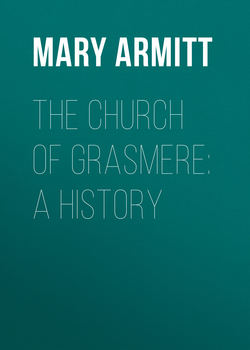Читать книгу The Church of Grasmere: A History - Armitt Mary L. - Страница 11
PART II
THE EIGHTEEN
ОглавлениеNot Twenty-four, but Eighteen represented the interests of the townships in the parish church. This was the case also at Crosthwaite in Cumberland, where this ancient body of "sworn" men were swept away by the Charity Commissioners at the time that they took over the schools. Of the Eighteen in Grasmere six represented – along with two wardens – each township. While the wardens, who were all landholders, took office for one year only, and in rotation, like all other officials of the village communities, such as constable, overseer, surveyor of roads, and frithman, the Eighteen appear to have been freely elected, and they kept office for an indefinite period.
The names of those who served the office at the Restoration are given in the important document concerning the fabric of the church printed later, and these names were but slowly altered. In the churchwardens' books of 1723 is written "Then chosen Edward Brockbank to be an Eighteen man for Little Langdale in the place of John Brockbank his father, deceased." Again in 1824 comes "Sides-Man Chosen by the Minister Churchwardens and Sides-men," followed by their names. A list of these was but infrequently written out, only an erasure marking a change, as when in 1708 John Green, serving for Grasmere "being Very Old and infirm, desired to be excused," and Thomas Green took his place.
The choice of a new member of the body lay apparently with the Eighteen themselves, the wardens, and the parson. This is still the case in Windermere, where (I am told) the choice of a new member of the Twenty-four is discussed in full vestry, the clergyman, however, finally nominating.55 Yet the Eighteen were acting representatives in church affairs of the folk of the townships. All contracts for the improvement and alteration of the church were made by them. They were responsible for the share of their township in its upkeep, and laid a rate on the landholders to cover the yearly expenses. It is almost certain that the appointment of a clerk and schoolmaster lay with them and the wardens, though the parson no doubt sat at the conclave. We have no means of knowing whether their powers extended further.56
It should be noted that the old name for them was simply "The Eighteen." They are called Questmen in a contract of 1687, but this appears to have been drawn up by a stranger. The term Sidesmen occurs late, and so does "The Twenty-four" which reckons the six wardens, two for each township, in the number. Strictly, the wardens (of whom there were eight in Cartmel) should not be included.
55
From Mr. George Browne, one of the Twenty-four.
56
At Holme Cultram, Cumberland, a like body – chosen, however, by the people themselves – were responsible for the care of the bridges and common wood, besides providing for the upkeep of the sea-dyke. See "The Sixteen Men of Holme Cultram," Transactions, Cumberland and Westmorland Antiquarian Society, N.S., 3. The Eighteen of Aston, Oxfordshire, were found in 1583 to have control over the common field and meadow, with the yearly allotments made within them. See "Survival of Archaic Communities," Prof. F. W. Maitland (Law Quarterly Review, vol. 9). Prof. Maitland regards the existence of this body as an exceptional case, and thinks it dangerous to assume it to have been a survival of ancient times. Mr. G. G. Coulton in Chaucer and his England considers that the Black Death of 1348-9 and the consequent diminution of the clergy may have thrown the people on their own resources, and caused the lay control over parish finances which appears to have dated (he says) from the fifteenth century.
